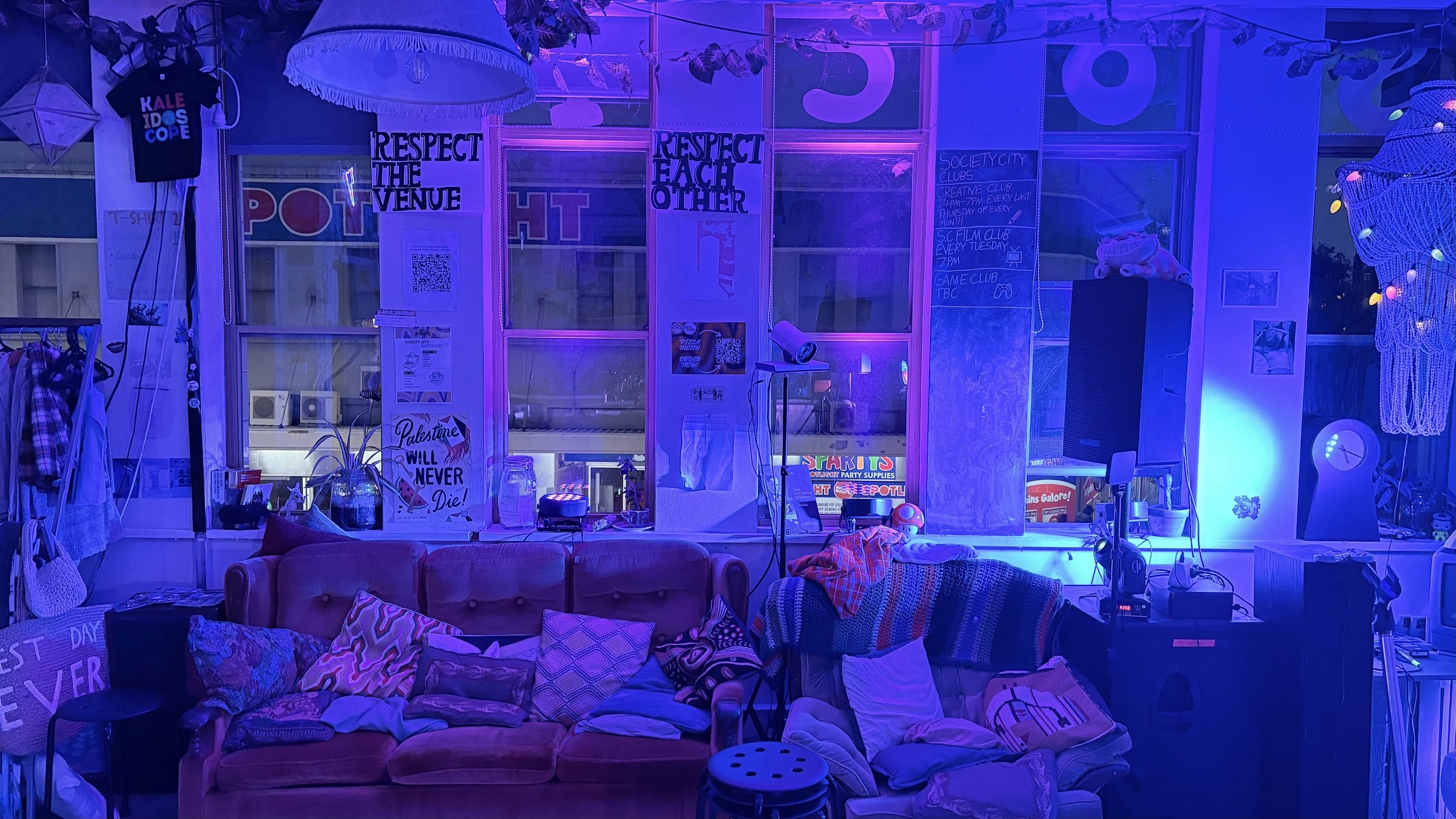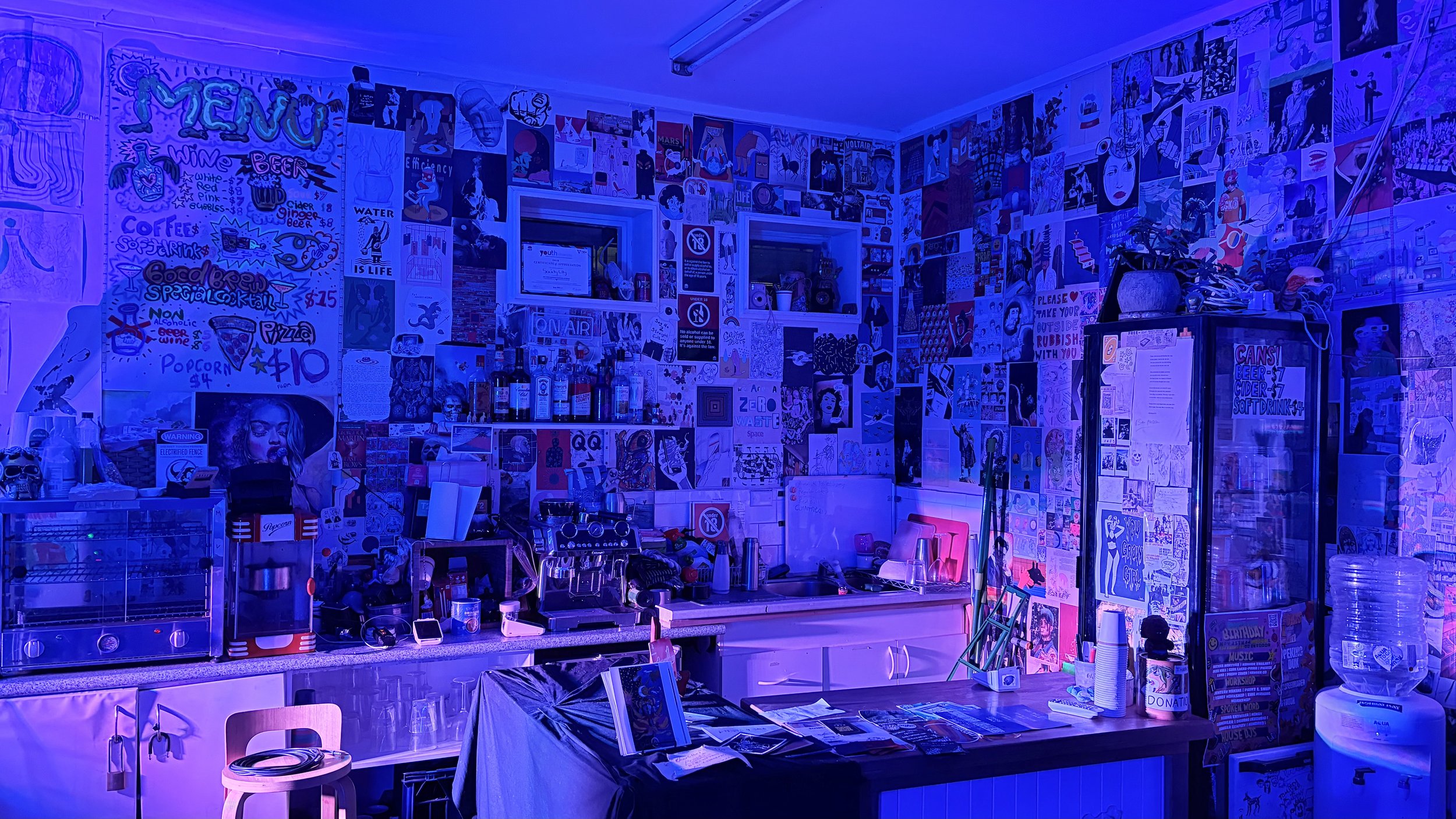Society City’s Josh Shimmen on the Wollongong scene, rising venue costs, and Rad Bar
Last week, I spoke to Josh Shimmen, the manager of creative community space Society City in Wollongong for my feature article on small venues collapsing across Australia. Our chat lasted for 30 minutes and he had such fascinating insights into the local scene that I’m publishing our interview, slightly edited for clarity. Enjoy!
I've heard people describe Society City as a third place in Wollongong. What does that term mean to you and how important are these spaces in a community?
I have defining a third space as a space that's not your home and not where you work. It's another hub area, community, venue space, whatever you want to call it. It's a home away from home. And I think there is a big talk about spaces like this and why they're important.
I've had people networking here, I've had people start businesses out of here, I've had musicians meet and start bands, and I think that's what it truly is. It's a place to meet like-minded people that's not a bar.
The non-expectation of spending is kind of what the third space is all about. Because if you want a home away from home, you can't go to a cafe. You're going to get tapped on the shoulder—”Do you want a coffee?” “Do you want this?” It's not a true third space.
When we were open during the day, it kind of really fed into that third space a lot more because the doors were open a lot more. So you could just kind of come in. And I think if I opened it during the day now, it'd be busy. But I just don't have the staff for it.
“I’ve had people networking here, I’ve had people start businesses out of here, I’ve had musicians meet and start bands, and I think that’s what it truly is. It’s a place to meet like-minded people that’s not a bar.”
How long has Society City been open for events only?
It started this year. Volunteers are great, but they're also volunteers, so the time expectation from me to them is not always there.
Everyone here who helps out is either studying or working. I just don't have the ability to have it open during the day, but hopefully we get big enough to be able to staff it during the day. I would do it tomorrow if I could.
You host a lot of music events specifically from emerging artists, some performing for the very first time, especially with the open mic showcases. What does a venue like this mean to those artists?
I think it legitimises their art. This is not a massive venue by any stretch, you know? It's 50 people capacity, it's quite small, but it's quite cosy. It’s not a [La La La’s] that has like 300 capacity or a Dicey’s that has 200-something capacity. It is meant to be small. We're leaning into being small.
I've had 13 year olds in here play. And they can play to their family, play to their friends. It feels like a gig. It's professionally done. They get that kind of legitimisation of, “well, I can do this. This is actually not that hard. I don't have to work and play for 15 years to break into a scene.”
I think the emerging artist side of it is good, especially in the art gallery. People that want to put their work up that can't get into an art gallery or can't afford to do that is a big part of it too. Our production rate is pretty cheap compared to what you get for around. And because we don't take tickets from artists, the focus is really on ensuring that they get paid.
“I’ve had 13 year olds in here play. And they can play to their family, play to their friends. It feels like a gig. It’s professionally done. They get that kind of legitimisation of, ‘well, I can do this. This is actually not that hard.’”
It kind of reminds me of Rad Bar.
I get the Rad in comparison all the time. It’s Rad Bar, but cleaner. That’s the part of Rad Bar that people remember is that tight-knit, experience-driven show… not necessarily the sticky floors. And, you know, I've had [events] here where we've been at full capacity and people are struggling to get past each other, but it's like being at a house party. That's how I grew up—you know, in lounges and playing in garages and, you know, having my drinks and bumping past people. Like, that's part of the fun.
I think there is that nostalgic factor for house parties—people don't have houses anymore to throw parties in. Especially sharehouses.
I've walked in and found art on the table just from people drawing, just like doodling while they're sitting here; people write stuff on the wall, you know, it's a creative space. The idea that people can come in and kind of contribute to it, even in passing—that's the idea.
Have costs like rent, insurance, lighting… toilet paper… licensing, increased recently?
Majorly. My beers are only seven bucks, you know, always. There’s no happy hour. I could raise them. I don't want to, because again, the idea is that this place, the culture, the music, the community is first.. oh, and there's a licensed bar. Like, that should be second; but it is the biggest revenue generator. And even with it being the biggest revenue generator, I still don't promo it, because that's not the idea. The idea is that the space comes first: the ability to come in and read a book should trump “we've got drink specials.”
Our rent increased last year. We've been in rental debt pretty much since they [old owners] opened. Like when I took it over, they were $5,000 in debt. We got that back down to zero in the six months that I took it over, but then it immediately went up again.
Insurance is a killer. Rent is a killer. And when this place first opened, it was rent free. We got 12 months under this Renew Wollongong initiative, which, honestly, they should be doing that again if they're not already thinking about it. If we're going to be talking about revitalising the city and getting more people out, unfortunately that shit costs money.
Like for us here, we have got zero funding. We've got nothing. Other than that initial free rent period, which was four years before I took it over.
So you receive no funding from the government, no council, nothing like that… are you eligible for anything?
I'm sure that we are. I feel like being one of the only independent community driven places here would almost already qualify for almost automatic funding. But I don't have grant writers, I don't have time to sit down and do that kind of stuff. It takes time to do all that.
A lot of it's been through like community donations, that's how we originally paid our rent. But obviously we haven't done that for over a year, which I'm pretty proud of. You ask for people to donate and they'll donate. But I'm trying to make the place self-sustainable.
You know, we can do enough here that allows us to—even if we're just staying alive—we're staying alive of our own volition.
1,300 venues have closed since the pandemic started around Australia, which is one third of all small to medium-sized venues in the country with the vast majority due to financial troubles. Do you think more can be done to generally save these venues that are struggling, by councils, by governments, even by the people?
Yeah, I think it can be. I think there needs to be a mindset shift… Honestly, I think everyone is responsible for it.
I think to put it just on the councils is not fair, just on the governments is not fair, but they do have a role…if you look at what the arts is, and what people get out of it, it's essentially a no brainer. But again, you can't help all of them.
So at that point, the venues need to start going, “how do we carve out what we need to do?” Like, I mean, you can see it in pubs and clubs anyway. You can't just be a pub with a beer garden anymore. You've got to do trivia. You've got to do drag bingo. You've got to do a meat raffle. You've got to do music, comedy, you've got to do everything. And you've got to keep doing that because people want more and more and more.
I've seen there's an Instagram channel where it's just a guy who goes to shows based on the flyer. That's cool. You might not like it, it might not be your vibe, but hey, you're supporting the scene.
There's not that many people that say they love live music that's directly translated into people going to live music… I think when they say they love live music, it's “I love the ones that I want to go and see.” Which is totally fine. But becoming more individualised on what you want to see is actually hurting the industry, because you're not supporting these bands, and they do become more insular… it just becomes the same crowd going to the same acts. They'll eventually start dropping off because they've seen the same band five or six times and then the band needs to evolve.
If you want the space to live, you want the space to thrive, and you want not just this one, but the space as in the scene, you've got to support it. You've got to buy a book, buy a beer, buy a t-shirt, buy something, you know? That really makes a difference. And if enough people do that, then the venues can not just make money, not just survive, but make money to scale, to then prove something like this could work in a bigger venue.
It's not just, “let's lump it all on council and say they're not doing enough.” It's not true, you know? If we could all take this kind of collective responsibility for the scene, it'll be much healthier moving forward.
“If you want the space to live, you want the space to thrive... you’ve got to support it. You’ve got to buy a book, buy a beer, buy a t-shirt.”


